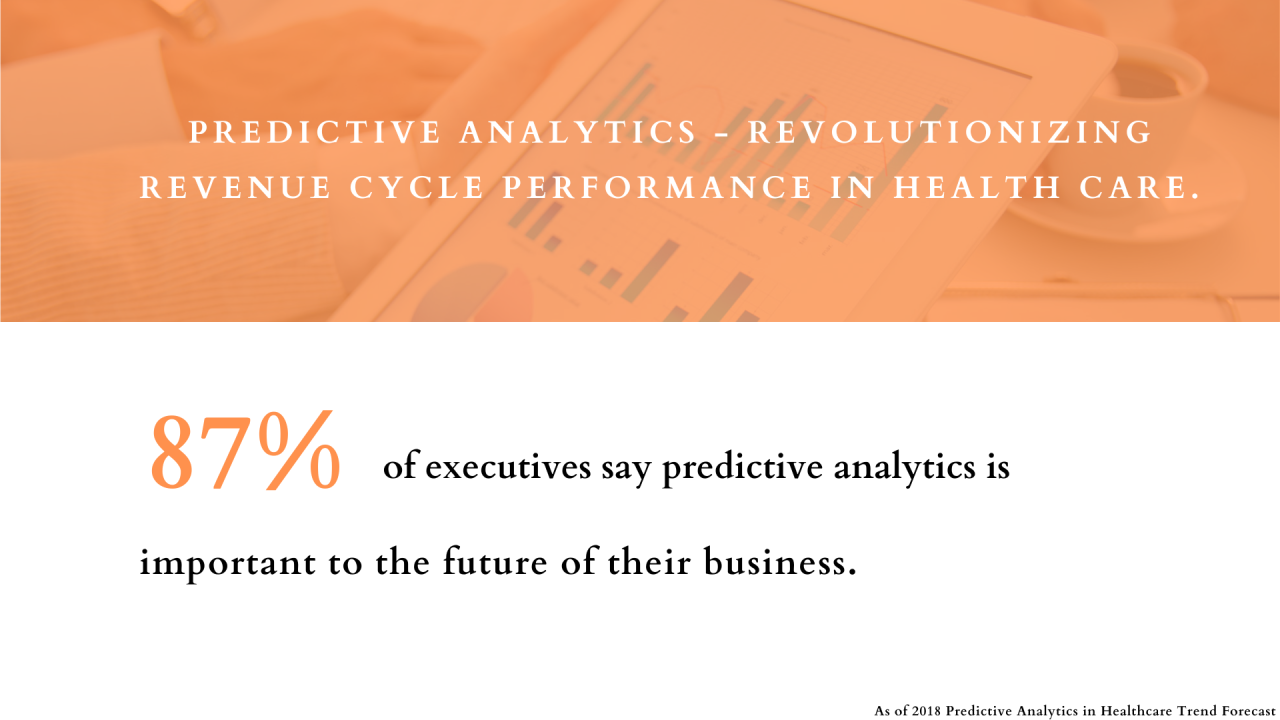Predictive analytics in healthcare uses data to predict outcomes, optimize treatments, and improve patient care. This technology leverages historical and real-time data for proactive decision-making.
Healthcare providers can enhance patient outcomes by using predictive analytics to identify trends and risks before they escalate. By analyzing patterns in patient data, healthcare organizations can personalize treatments, reduce hospital readmissions, and lower healthcare costs. The insights gained from predictive analytics empower healthcare professionals to make timely interventions, ultimately leading to more efficient and effective care delivery.
As this technology continues to evolve, its potential to revolutionize healthcare remains vast.

Credit: medriva.com
The Power Of Predictive Analytics
Predictive analytics in healthcare has the power to transform the way medical professionals deliver care, revolutionizing the industry through data-driven insights and innovative solutions. By harnessing the potential of predictive analytics, healthcare providers can anticipate health trends, forecast patient outcomes, and make proactive decisions, ultimately leading to improved patient care, reduced costs, and enhanced operational efficiency.
Revolutionizing Healthcare
The implementation of predictive analytics is revolutionizing healthcare by empowering clinicians and administrators with advanced predictive capabilities. Through the utilization of sophisticated algorithms and machine learning techniques, healthcare organizations can identify patterns in patient data, anticipate potential medical conditions, and proactively address emerging health concerns.
Improving Patient Outcomes
Predictive analytics plays a crucial role in improving patient outcomes by predicting and preventing adverse events, reducing hospital readmissions, and optimizing treatment plans. By leveraging predictive models, healthcare providers can personalize care strategies, intervene early in disease progression, and enhance overall patient well-being.
Predictive Analytics Tools In Healthcare
Healthcare institutions are increasingly turning to predictive analytics to improve patient outcomes and operational efficiency. These tools leverage advanced technologies to forecast trends, identify high-risk patients, and streamline decision-making processes.
Machine Learning Algorithms
Machine learning algorithms play a crucial role in predictive analytics in healthcare. These algorithms analyze vast amounts of data to generate insights, predict outcomes, and personalize patient care based on individual characteristics.
Data Collection And Integration
Effective predictive analytics tools require efficient data collection and integration processes. By consolidating information from various sources such as electronic health records, diagnostic tests, and wearable devices, healthcare providers can build comprehensive datasets for analysis.
Predictive Analytics In Disease Prevention
Predictive analytics plays a vital role in healthcare by leveraging data to anticipate and prevent diseases. By analyzing patterns and trends, healthcare professionals can proactively identify and address health issues, improving patient outcomes and reducing medical costs.
Identifying High-risk Patients
Predictive analytics plays a crucial role in disease prevention by identifying high-risk patients early.
- Helps healthcare providers focus on preventive measures for at-risk individuals
- Utilizes historical data to predict potential health issues before they escalate
Early Detection And Intervention
Early detection is key in preventing diseases, and predictive analytics enables timely intervention.
- Allows for personalized healthcare strategies based on individual risk factors
- Improves patient outcomes by initiating treatment at the earliest signs of trouble
Enhancing Treatment Plans With Predictive Analytics
Personalized Medicine
In the realm of healthcare, predictive analytics is revolutionizing the approach to treatment plans.
By leveraging patient data, including genetics, lifestyle, and medical history, healthcare providers can create personalized treatment plans tailored to an individual’s specific needs.
Optimizing Hospital Operations
Implementing predictive analytics in healthcare is not limited to treatment plans; it also plays a pivotal role in optimizing hospital operations.
Challenges And Ethical Considerations
As the use of predictive analytics in healthcare continues to evolve, it is crucial to recognize the challenges and ethical considerations associated with this powerful technology. By diving into the topics of data privacy and security and ensuring equity in healthcare, we can gain a better understanding of the impact of predictive analytics on patients and the healthcare industry as a whole.
Data Privacy And Security
One of the primary concerns when it comes to predictive analytics in healthcare is the protection of sensitive patient data. With the vast amount of information being collected and analyzed, ensuring the privacy and security of this data is paramount. Healthcare organizations must implement robust security measures, including strong encryption protocols, access controls, and regular data backups, to safeguard against unauthorized access and potential breaches.
Moreover, it is essential for healthcare providers to adhere to strict data privacy regulations, such as the Health Insurance Portability and Accountability Act (HIPAA) in the United States, to maintain patient trust and comply with legal requirements. By prioritizing data privacy and security, healthcare organizations can mitigate the risks associated with predictive analytics and protect the sensitive information of their patients.
Ensuring Equity In Healthcare
While predictive analytics has the potential to revolutionize healthcare by identifying patterns, predicting outcomes, and improving treatment plans, it is crucial to ensure that these technologies do not perpetuate existing healthcare disparities or bias. By carefully addressing ethical considerations, healthcare providers can work towards ensuring equitable access to quality care for all patients.
One way to tackle this challenge is to actively monitor and evaluate the predictive models and algorithms used in healthcare systems. By examining the input variables, decision-making processes, and outcomes of these models, healthcare providers can identify and rectify any biases or disparities that may arise. Additionally, promoting diversity in the development and implementation of predictive analytics can help to minimize the risk of bias and facilitate a more inclusive and equitable healthcare system.
Furthermore, transparency and clear communication with patients are key in building trust and equity within predictive analytics in healthcare. Ensuring that patients understand the purpose and potential limitations of these predictive models can empower them to make informed decisions about their own healthcare.

Credit: blogs.microsoft.com

Credit: www.linkedin.com
Conclusion
Incorporating predictive analytics in healthcare can revolutionize patient care and outcomes. The power of data-driven insights enables early intervention, personalized treatments, and cost-effective healthcare delivery. As the industry continues to evolve, leveraging predictive analytics will be essential for improving overall quality and effectiveness in healthcare services.




